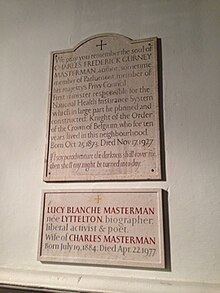
Joseph Chamberlain was a British statesman who was first a radical Liberal, then a Liberal Unionist after opposing home rule for Ireland, and eventually was a leading imperialist in coalition with the Conservatives. He split both major British parties in the course of his career. He was the father, by different marriages, of Nobel Peace Prize winner Austen Chamberlain and of Prime Minister Neville Chamberlain.

Robert Arthur Talbot Gascoyne-Cecil, 3rd Marquess of Salisbury, known as Lord Salisbury, was a British statesman and Conservative politician who served as Prime Minister of the United Kingdom three times for a total of over thirteen years. He was also Foreign Secretary before and during most of his tenure. He avoided international alignments or alliances, maintaining the policy of "splendid isolation".

Spencer Compton Cavendish, 8th Duke of Devonshire,, styled Lord Cavendish of Keighley between 1834 and 1858 and Marquess of Hartington between 1858 and 1891, was a British statesman. He has the distinction of having held leading positions in three political parties: leading the Liberal Party, the Liberal Unionist Party and the Conservative Party in either the House of Commons or the House of Lords. After 1886 he increasingly voted with the Conservatives. He declined to become prime minister on three occasions, because the circumstances were never right. Historian and politician Roy Jenkins said he was "too easy-going and too little of a party man." He held some passions, but he rarely displayed them regarding the most controversial issues of the day.
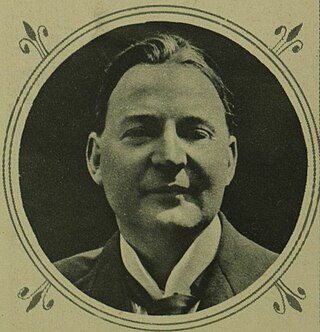
Charles Frederick Gurney Masterman PC MP was a British radical Liberal Party politician, intellectual and man of letters. He worked closely with such Liberal leaders as David Lloyd George and Winston Churchill in designing social welfare projects, including the National Insurance Act 1911. During the First World War, he played a central role in the main government propaganda agency.

Philip Guedalla was an English barrister, and a popular historical and travel writer and biographer. His wit and epigrams are well-known, one example being "Even reviewers read a Preface". He also was the originator of a now-common theory on Henry James, writing that "The work of Henry James has always seemed divisible by a simple dynastic arrangement into three reigns: James I, James II, and the Old Pretender."
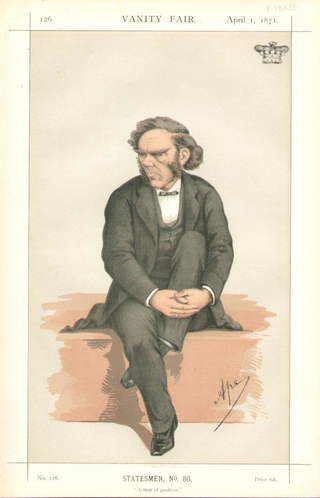
George William Lyttelton, 4th Baron Lyttelton, 4th Baron Westcote, was an English aristocrat and Conservative politician from the Lyttelton family. He was chairman of the Canterbury Association, which encouraged British settlers to move to New Zealand.

The Redistribution of Seats Act 1885 was an Act of the Parliament of the United Kingdom. It was a piece of electoral reform legislation that redistributed the seats in the House of Commons, introducing the concept of equally populated constituencies, a concept in the broader global context termed equal apportionment, in an attempt to equalise representation across the UK. It mandated the abolition of constituencies below a certain population threshold. It was associated with, but not part of, the Representation of the People Act 1884.

Lucy Caroline Cavendish, also known as Lady Frederick Cavendish, was a pioneer of women's education.
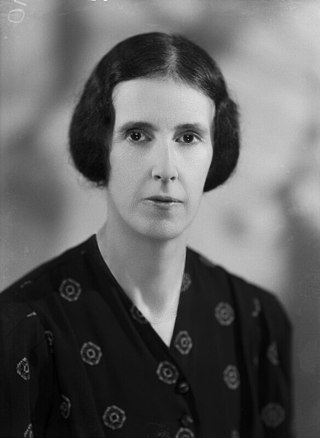
Lucy Edith Noel-Buxton, Baroness Noel-Buxton, was a British Labour Party politician.

Mary Drew was a political secretary, writer, and hostess. She was the daughter of the British prime minister William Ewart Gladstone, and achieved notability as his advisor, confidante and private secretary. She also attained a fair degree of political influence by controlling access to him.

Robert Hamilton Bernays was a Liberal Party and later Liberal National politician in the United Kingdom who served as a Member of Parliament (MP) from 1931 to 1945.
The Hawarden Kite was a famous British newspaper scoop of December 1885, revealing that Liberal Party leader and Leader of the Opposition William Ewart Gladstone now supported home rule for Ireland. It was an instance of "kite-flying", made by Gladstone's son Herbert, who often served as his father's secretary. It was given to Edmund Rogers of the National Press Agency in London. The statement was accurate but it is unknown whether the father knew and approved of releasing it to the press. The bombshell announcement resulted in the fall of Lord Salisbury's Conservative government. Irish Nationalists, led by Charles Parnell's Irish Parliamentary Party, held the balance of power in Parliament. Gladstone's conversion to home rule convinced them to switch away from the Conservatives and support the Liberals using the 86 seats in Parliament they controlled.

Catherine Gladstone was the wife of British statesman William Ewart Gladstone for 59 years, from 1839 until his death in 1898.
The 1931 Salisbury by-election was a by-election held for the British House of Commons constituency of Salisbury in Wiltshire on 11 March 1931. The seat had become vacant on the resignation of the sitting Conservative Member of Parliament Hugh Morrison, and the by-election was won by the Conservative candidate James Despencer-Robertson.

Rt Hon. Sir Daniel Ford Goddard PC JP was a British civil engineer, businessman and Liberal Party politician who served as a Member of Parliament (MP) for Ipswich from 1895 to 1918. He was also Mayor of Ipswich from 1891 to 1892.
The 1911 Glasgow Tradeston by-election was a Parliamentary by-election held on 6 July 1911. It returned one Member of Parliament (MP) to the House of Commons of the Parliament of the United Kingdom, elected by the first past the post voting system.
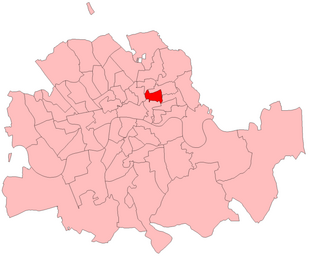
The Bethnal Green South West by-election was a Parliamentary by-election held on 29 July 1911. It returned one Member of Parliament (MP) to the House of Commons of the Parliament of the United Kingdom, elected by the first past the post voting system.
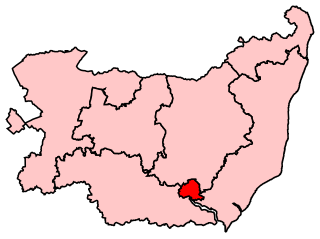
The 1914 Ipswich by-election was a Parliamentary by-election held on 23 May 1914. The constituency returned two Members of Parliament (MP) to the House of Commons of the United Kingdom, elected by the first past the post voting system.

The 1914 Bethnal Green South West by-election was a Parliamentary by-election held on 19 February 1914. The constituency returned one Member of Parliament (MP) to the House of Commons of the United Kingdom, elected by the first past the post voting system.

The Lyttelton family is a British aristocratic family. Over time, several members of the Lyttelton family were made knights, baronets and peers. Hereditary titles held by the Lyttelton family include the viscountcies of Cobham and Chandos, as well as the Lyttelton barony and Lyttelton baronetcy. Several other members of the family have also risen to prominence, particularly in the field of cricket.

